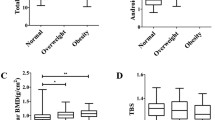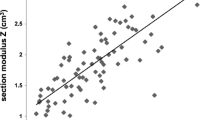Abstract
The protective effect of total fat mass on bone mineral density (BMD) has been challenged with studies showing no or negative association after adjusting for weight. Subsequently, more studies have evaluated the relationship of regional adiposity with BMD, and findings were inconsistent for central obesity. Advancements in imaging techniques enable us to directly and noninvasively study the role of adiposity on skeletal health. Visceral adiposity measured by computed tomography (CT) has consistently been shown to have negative effects on bone. Availability of magnetic resonance spectroscopy (MRS) also allows us to noninvasively quantify bone marrow fat (BMF), which has been known to be associated with osteoporosis from histomorphometric studies. Using MRS along with dual energy x-ray absorptiometry, studies have reported a detrimental role of BMF on BMD. With the increase in aging and obesity of the population, it is important to continue this effort in identifying the contribution of adipose tissues to bone quality and fracture.
Similar content being viewed by others
References
Papers of particular interest, published recently, have been highlighted as: • Of importance •• Of major importance
• Zhao LJ, Liu YJ, Liu PY, et al. Relationship of obesity with osteoporosis. J Clin Endocrinol Metab. 2007;92(5):1640–6. This study demonstrates a negative correlation between fat mass and bone mass, both environmentally and genetically, after controlling for body weight.
•• Yamaguchi T, Kanazawa I, Yamamoto M, et al. Associations between components of the metabolic syndrome versus bone mineral density and vertebral fractures in patients with type 2 diabetes. Bone 2009;45(2):174–9. This study uses direct measure of VAT and demonstrated its protective role on vertebral fracture.
Hsu YH, Venners SA, Terwedow HA, et al. Relation of body composition, fat mass, and serum lipids to osteoporotic fractures and bone mineral density in Chinese men and women. Am J Clin Nutr. 2006;83(1):146–54.
Janicka A, Wren TA, Sanchez MM, et al. Fat mass is not beneficial to bone in adolescents and young adults. J Clin Endocrinol Metab. 2007;92(1):143–7.
Travison TG, Araujo AB, Esche GR, et al. Lean mass and not fat mass is associated with male proximal femur strength. J Bone Miner Res. 2008;23(2):189–98.
Langlois JA, Visser M, Davidovic LS, et al. Hip fracture risk in older white men is associated with change in body weight from age 50 years to old age. Arch Intern Med. 1998;158(9):990–6.
Ensrud KE, Fullman RL, Barrett-Connor E, et al. Voluntary weight reduction in older men increases hip bone loss: the osteoporotic fractures in men study. J Clin Endocrinol Metab. 2005;90(4):1998–2004.
Goodpaster BH, Krishnaswami S, Resnick H, et al. Association between regional adipose tissue distribution and both type 2 diabetes and impaired glucose tolerance in elderly men and women. Diabetes Care. 2003;26(2):372–9.
Miyawaki T, Abe M, Yahata K, et al. Contribution of visceral fat accumulation to the risk factors for atherosclerosis in non-obese Japanese. Intern Med. 2004;43(12):1138–44.
Mori Y, Hoshino K, Yokota K, et al. Differences in the pathology of the metabolic syndrome with or without visceral fat accumulation: a study in pre-diabetic Japanese middle-aged men. Endocrine. 2006;29(1):149–53.
Kuk JL, Katzmarzyk PT, Nichaman MZ, et al. Visceral fat is an independent predictor of all-cause mortality in men. Obesity (Silver Spring). 2006;14(2):336–41.
Kuk JL, Saunders TJ, Davidson LE, et al. Age-related changes in total and regional fat distribution. Ageing Res Rev. 2009;8(4):339–48.
Edelstein SL, Barrett-Connor E. Relation between body size and bone mineral density in elderly men and women. Am J Epidemiol. 1993;138(3):160–9.
Weiler HA, Janzen L, Green K, et al. Percent body fat and bone mass in healthy Canadian females 10 to 19 years of age. Bone. 2000;27(2):203–7.
Hu G, Tuomilehto J, Silventoinen K, et al. Body mass index, waist circumference, and waist-hip ratio on the risk of total and type-specific stroke. Arch Intern Med. 2007;167(13):1420–7.
Katzmarzyk PT, Janssen I, Ross R, et al. The importance of waist circumference in the definition of metabolic syndrome: prospective analyses of mortality in men. Diabetes Care. 2006;29(2):404–9.
•• von Muhlen D, Safii S, Jassal SK, et al. Associations between the metabolic syndrome and bone health in older men and women: the Rancho Bernardo Study. Osteoporos Int. 2007;18(10):1337–44. This study investigates the longitudinal relationship between MetS and nonvertebral fracture. A positive association is found.
Warming L, Ravn P, Christiansen C. Visceral fat is more important than peripheral fat for endometrial thickness and bone mass in healthy postmenopausal women. Am J Obstet Gynecol. 2003;188(2):349–53.
• Choi HS, Kim KJ, Kim KM, et al. Relationship between visceral adiposity and bone mineral density in Korean adults. Calcif Tissue Int. 2010;87(3):218–25. This study investigates the relationship of BMD with various measures of body composition and metabolic factors.
Jankowska EA, Rogucka E, Medras M. Are general obesity and visceral adiposity in men linked to reduced bone mineral content resulting from normal ageing? A population-based study. Andrologia. 2001;33(6):384–9.
• Kim CJ, Oh KW, Rhee EJ, et al. Relationship between body composition and bone mineral density (BMD) in perimenopausal Korean women. Clin Endocrinol. (Oxf) 2009;71(1):18–26. This study shows that WHR is negatively associated with spine BMD after adjusting for all confounders, whereas fat mass shows an inconsistent correlation with BMD.
Nguyen ND, Pongchaiyakul C, Center JR, et al. Abdominal fat and hip fracture risk in the elderly: the Dubbo Osteoporosis Epidemiology Study. BMC Musculoskelet Disord. 2005;6:11.
Ensrud KE, Lipschutz RC, Cauley JA, et al. Body size and hip fracture risk in older women: a prospective study. Study of Osteoporotic Fractures Research Group. Am J Med. 1997;103(4):274–80.
•• Russell M, Mendes N, Miller KK, et al. Visceral fat is a negative predictor of bone density measures in obese adolescent girls. J Clin Endocrinol Metab.;95(3):1247–55. This study uses MRI to measure SAT and VAT, and demonstrates a different effect of these two adipose tissues on BMD.
•• Gilsanz V, Chalfant J, Mo AO, et al. Reciprocal relations of subcutaneous and visceral fat to bone structure and strength. J Clin Endocrinol Metab. 2009;94(9):3387–93. This article summarizes underlying mechanisms contributing to the differential effect of SAT and VAT on BMD.
• Kinjo M, Setoguchi S, Solomon DH. Bone mineral density in adults with the metabolic syndrome: analysis in a population-based U.S. sample. J Clin Endocrinol Metab. 2007;92(11):4161–4. This study uses data from the NHANES III to evaluate the relationship between metabolic function and BMD.
• Szulc P, Varennes A, Delmas PD, et al. Men with metabolic syndrome have lower bone mineral density but lower fracture risk—the MINOS study. J Bone Miner Res. 2010;25(6):1446–54. This study reports lower BMD but lower fracture risk among men with MetS than those without. They also identify factors that contribute to this paradoxical observation.
Ahmed LA, Schirmer H, Berntsen GK, et al. Features of the metabolic syndrome and the risk of non-vertebral fractures: the Tromso study. Osteoporos Int. 2006;17(3):426–32.
Pollock NK, Bernard PJ, Wenger K, et al. Lower bone mass in prepubertal overweight children with pre-diabetes. J Bone Miner Res.
• MacKenzie SM, Huda SS, Sattar N, et al. Depot-specific steroidogenic gene transcription in human adipose tissue. Clin Endocrinol. (Oxf) 2008;69(6):848–54. This study uses paired adipose tissues and demonstrates that steroidogenic gene expressed in both adipose tissues, but the transcript level is different.
Verma S, Rajaratnam JH, Denton J, et al. Adipocytic proportion of bone marrow is inversely related to bone formation in osteoporosis. J Clin Pathol. 2002;55(9):693–8.
Justesen J, Stenderup K, Ebbesen EN, et al. Adipocyte tissue volume in bone marrow is increased with aging and in patients with osteoporosis. Biogerontology. 2001;2(3):165–71.
Machann J, Stefan N, Schick F. (1)H MR spectroscopy of skeletal muscle, liver and bone marrow. Eur J Radiol. 2008;67(2):275–84.
Vande Berg BC, Malghem J, Lecouvet FE, et al. Magnetic resonance imaging of the normal bone marrow. Eur Radiol. 8(8), 1327–1334
Baron R. General principle of bone biology. In: Favus MJ, editor. Primer on the metabolic bone diseases and disorders of mineral metabolism. 5th ed. Washington, DC: American Society for Bone and Mineral Research; 2003. p. 1–8.
Rosen CJ, Bouxsein ML. Mechanisms of disease: is osteoporosis the obesity of bone? Nat Clin Pract Rheumatol. 2006;2(1):35–43.
Wang Y, Wan C, Gilbert SR, et al. Oxygen sensing and osteogenesis. Ann N Y Acad Sci. 2007;1117:1–11.
Zhou S, Greenberger JS, Epperly MW, et al. Age-related intrinsic changes in human bone-marrow-derived mesenchymal stem cells and their differentiation to osteoblasts. Aging Cell. 2008;7(3):335–43.
Vogler 3rd JB, Murphy WA. Bone marrow imaging. Radiology. 1988;168(3):679–93.
Griffith JF, Yeung DK, Antonio GE, et al. Vertebral bone mineral density, marrow perfusion, and fat content in healthy men and men with osteoporosis: dynamic contrast-enhanced MR imaging and MR spectroscopy. Radiology. 2005;236(3):945–51.
Griffith JF, Yeung DK, Antonio GE, et al. Vertebral marrow fat content and diffusion and perfusion indexes in women with varying bone density: MR evaluation. Radiology. 2006;241(3):831–8.
Yeung DK, Griffith JF, Antonio GE, et al. Osteoporosis is associated with increased marrow fat content and decreased marrow fat unsaturation: a proton MR spectroscopy study. J Magn Reson Imaging. 2005;22(2):279–85.
Shih TT, Chang CJ, Hsu CY, et al. Correlation of bone marrow lipid water content with bone mineral density on the lumbar spine. Spine. 2004;29(24):2844–50.
Schellinger D, Lin CS, Lim J, et al. Bone marrow fat and bone mineral density on proton MR spectroscopy and dual-energy X-ray absorptiometry: their ratio as a new indicator of bone weakening. AJR Am J Roentgenol. 2004;183(6):1761–5.
Schellinger D, Lin CS, Hatipoglu HG, et al. Potential value of vertebral proton MR spectroscopy in determining bone weakness. AJNR Am J Neuroradiol. 2001;22(8):1620–7.
• Tang GY, Lv ZW, Tang RB, et al. Evaluation of MR spectroscopy and diffusion-weighted MRI in detecting bone marrow changes in postmenopausal women with osteoporosis. Clin Radiol. 2010;65(5):377–381. This a recent article evaluating the relationship of BMF with osteoporosis and BMD (in T-score).
•• Bredella MA, Torriani M, Ghomi RH, et al. Vertebral bone marrow fat is positively associated with visceral fat and inversely associated with IGF-1 in obese women. Obesity 2010;19(1):49–53. Although BMF is known to have different metabolic function than other fat depots, both BMF and VAT have been reported to have detrimental effects on bone. This study investigates the association among BMF, VAT, and BMD, as well as important hormones for bone homeostasis.
• Shen W, Chen J, Punyanitya M, et al. MRI-measured bone marrow adipose tissue is inversely related to DXA-measured bone mineral in Caucasian women. Osteoporos Int. 2007;18(5):641–7. This is a unique study using MRI to measure total-body BMF. It evaluates the relationship of BMF with BMD and body composition.
• Di Iorgi N, Rosol M, Mittelman SD, et al. Reciprocal relation between marrow adiposity and the amount of bone in the axial and appendicular skeleton of young adults. J Clin Endocrinol Metab. 2008;93(6):2281–6. This study includes a relatively large number of adolescents and young adults to evaluate the relationship of BMF with cortical and trabecular bone.
Ecklund K, Vajapeyam S, Feldman HA, et al. Bone marrow changes in adolescent girls with anorexia nervosa. J Bone Miner Res. 2010;25(2):298–304.
•• Bredella MA, Fazeli PK, Miller KK, et al. Increased bone marrow fat in anorexia nervosa. J Clin Endocrinol Metab. 2009;94(6):2129–36. This study shows negative correlations between BMF and BMD at both lumbar spine and femur, as well as between BMF and adipose tissues at femur only in patients with AN.
Acknowledgments
Y. Sheu is supported as a post-doctoral fellow on National Institute on Aging grant T32-AG000181-16. J.A. Cauley receives institutional support from a National Institutes of Health grant.
Disclosure
No potential conflicts of interest relevant to this article were reported.
Author information
Authors and Affiliations
Corresponding author
Rights and permissions
About this article
Cite this article
Sheu, Y., Cauley, J.A. The Role of Bone Marrow and Visceral Fat on Bone Metabolism. Curr Osteoporos Rep 9, 67–75 (2011). https://doi.org/10.1007/s11914-011-0051-6
Published:
Issue Date:
DOI: https://doi.org/10.1007/s11914-011-0051-6




